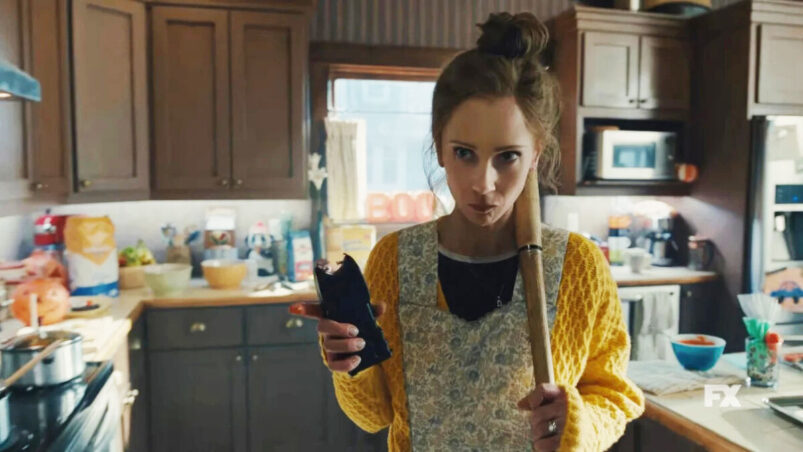Fargo’s fifth season is, genuinely, the much-vaunted and frequently misadvertised process of a franchise returning to its roots, in this case, the dynamics of the Coens’ 1996 film – but jumbled about in pleasingly unexpected fashion. Like the film, there’s a wet little man who works at a car dealership, an impossibly wealthy in-law, and a kidnapped wife, yet these familiar cogs turn together in very different ways.
For exactly this reason, you don’t need to have even heard of the original film for this setup to work, yet it’s the perfect sort of in-joke if you were a fan – a wonderful moment of dawning realisation as you start to see what it is they’re doing. It’s so strong as a setup that you wonder what Fargo’s been playing at by diverging from these robust elements.
Likewise, Fargo’s always been fond of spattering the Minnesotan snow with drops of blood, and this element of the ensemble is at its strongest when it embraces the absurd or the knockabout farce. Where the previous season drew upon Miller’s Crossing (itself happy to make extreme violence very funny), here there’s a bit more of the Home Alone to it – not just in the setting of traps, in having a blameless innocent go absolutely spare on home invaders who absolutely have it coming.
I wrote in my review of Fargo’s fourth season that it would hopefully represent them getting their obsession with gangsters out of their system. And sure enough, the fifth does see the franchise manage to move past its adolescent obsession with the rough, tough world of organised crime – the nearest it gets is a couple of mercenaries in the vein of Steve Buscemi and Peter Stormare in the original film.
But perhaps curiously, even though (because?) there isn’t a street tough or wiseguy in sight, the fifth season of Fargo brings us some cracking villains – evil Jon Hamm, his junior partner Joe ‘Stranger Things Steve’ Keery, and Jennifer Jason Leigh essentially cosplaying the late Jessica Walters at her most acidic. Nor does it mess around with them, it has them sparring as soon as it’s able, though for their sheer awful charm this is nowhere near soon enough.
Juno Temple, meanwhile, turns in an excellent role as a woman as fractured and quietly desperate as anyone would be in the face of Hamm, Keery, and Leigh’s triple threat. Her performance is the only thing that rescues a literal ‘and it was all a dream’ sequence, one that takes the best part of an episode to explain why she is the way she is, something which in context any fool could already have puzzled out.
If there’s a reason Temple feels underserved (and it is odd to have the apparent protagonist offscreen for a full episode), it can only be because of her character’s deep-seated niceness – and despite leaving the gang life alone, Fargo is still very enamoured, perhaps too much so, with its baddies. Again, this is a temptation that’d be hard to resist with any one of them, never mind the full triumvirate.
Should I include Sam Spruell’s character within that terrible threesome? The issue is he quickly becomes something beyond a straightforward antagonist. Above all else he’s basically a device for being a bit weird (rather than endearingly awful), and is inexplicably billed as Welsh despite a Scandinavian name, and, it’s strongly suggested, heritage. (Though granted, he sounds far less Scandinavian than the Minnesotans around him.)
This same confusion comes to the fore towards the end of the season, when things start to fall off. Ostensibly sensible characters, apparently with the same drive for self-preservation as the rest of us, casually parade themselves into the jaws of certain death. Another hitherto apparently sapient character, on the run in enemy territory and having got hold of a gun that they very much know how to use, sets it aside for no apparent reason.
These sense-defying dramatic turns are reminiscent of nothing so much as Game Of Thrones when that show had definitely let things start to fall off – big, gaspy moments, shoehorned into the narrative no matter how poorly they fit. And like Thrones, this gets more frequent as we draw closer to the big, sexy climax we have so clearly been promised.
Admittedly I’ve pointed to the most egregious examples here, but what stings worst is that this has to come at the expense of characters who’ve shown all the potential to become interesting. Even those of them that don’t blithely put their own heads in the noose and act baffled when they become short of breath end up short-changed, relegated to purely functional ancillary roles, or, worse yet, empty morality pets.
This ends up something of a backhanded compliment, though. It’s no mean feat to introduce so many dramatis personae rich with potential that you want to see them all developed, even if there’s no chance of pulling that off in a mere ten episodes. And as I’ve said, Fargo is very fond of its big central figures, so by nature there’s not too much time for anything else.
Am I expecting too much complexity from a show that is at its core a white hat showing the black hats what for? Perhaps so. This is really Fargo digging its own grave in having created a wider backdrop of such rich detail we can dream there’ll be some spotlight moment for all of it. It’s this background tapestry in which it finds itself snarled, but this doesn’t harm what’s going on in the foreground. Not too badly, anyway.
READ MORE: 10 Worst PS3 Games of All Time
Some of the coverage you find on Cultured Vultures contains affiliate links, which provide us with small commissions based on purchases made from visiting our site.




